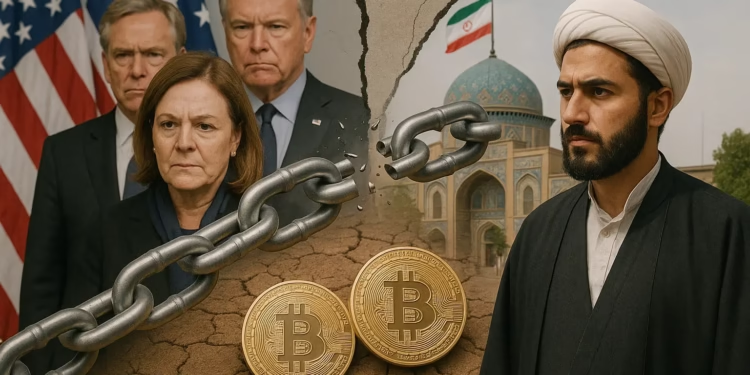Iran crypto flow has collapsed in recent months, with June inflows plunging over 50% year-over-year and July volumes crashing 76%, according to TRM Labs.
The decline comes as nuclear talks collapse, a 12-day conflict with Israel erupts, and widespread power outages rock the country — a triple blow that has drained confidence in local exchanges
Iran’s crypto ecosystem faces mounting strain from geopolitical tensions, regulatory crackdowns and declining trust in local exchanges, TRM Labs noted.
Nobitex Stays on Top After $90M Hack Shakes Market
Despite these challenges, Nobitex Iran’s largest crypto exchange remained the dominant player in 2025. TRM’s data shows Nobitex handled over 87% of Iranian linked crypto transactions with $2 billion of its $3 billion volume processed via the TRON network mainly in TRC-20 USDT and TRX.
However, Nobitex’s prominence also heightened systemic risks. On June 18, the exchange suffered a $90 million hack reportedly carried out by the pro Israel group Predatory Sparrow.
This breach froze liquidity, delayed transactions and prompted users to temporarily shift to other platforms.
TRM researchers noted a 150% surge in outflows from Nobitex in the week before the Iran Israel conflict as users sought safer alternatives. Many redirected their funds to global exchanges with minimal or no Know Your Customer (KYC) requirements.
Tether Freeze Deepens the Iran Crypto Flow Crisis
On July 2, Tether froze 42 wallets tied to Iranian entities, half linked to Nobitex and others tied to the IRGC. The freeze choked off settlement channels, forcing retail and institutional users to diversify into alternatives like DAI on Polygon. TRM Labs said the disruption amplified uncertainty and further weakened Iran crypto flow stability.
Illicit Activity Remains Low but Crypto Still Used for Sanctions Evasion
TRM Labs highlighted that while Iranian actors continue to use crypto for sanctions evasion and procurement of sensitive goods, illicit activity at Iranian exchanges made up just 0.9% of total volume comparable to global averages.
Ordinary Iranians are also turning to crypto as a safeguard against inflation and economic uncertainty even as trust in local platforms declines.
“For many citizens, crypto remains a vital savings tool amid currency devaluation and restricted access to international finance,” TRM noted.
However, the June hack exposed deeper vulnerabilities. TRM linked on chain activity at Nobitex to IRGC linked actor Amir Hossein Nikaeen Ravari and to Gaza Now a pro Hamas outlet sanctioned after the October 2023 attacks on Israel. Investigators also found Nobitex code enabling warrantless surveillance further undermining public trust.
A Resilient but Strained Crypto Landscape
Despite the strain, Iran crypto flow shows resilience. Bitcoin mining revenues are resurging, underground services like Novin Verify are growing, and even espionage payments have emerged on-chain.
TRM notes: “As trust in local exchanges erodes, Iranians are swiftly adapting by turning to alternative stablecoins, migrating across new blockchains, and experimenting with different settlement methods. The Iran crypto flow ecosystem remains fragile, but highly adaptive.”











